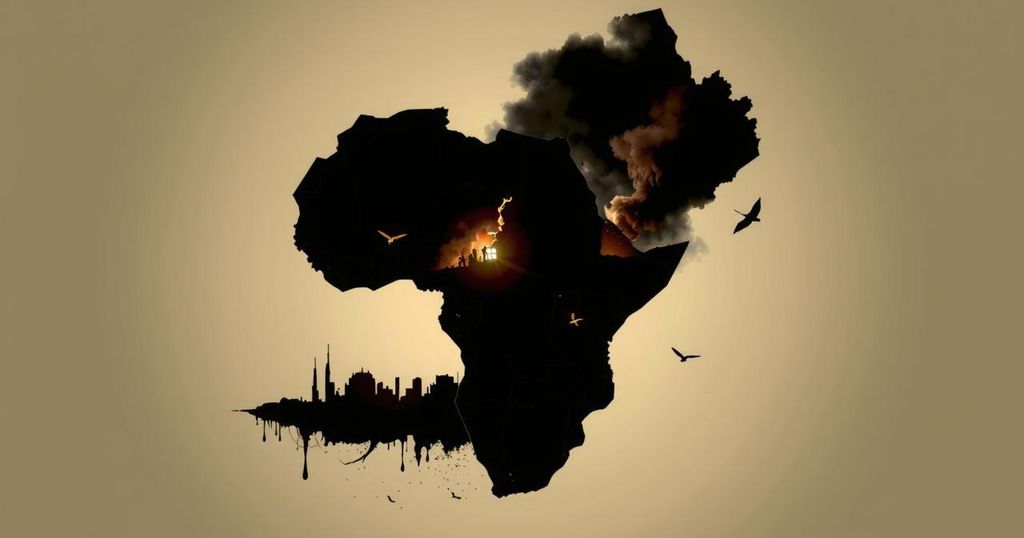Sudan’s Army Advances to Recapture Khartoum Amid Ongoing Humanitarian Crisis

Sudan’s national army is making significant strides in recapturing Khartoum from RSF paramilitaries, claiming major victories in key areas. Civilians are enduring intense violence and humanitarian crises, with famine affecting many. Both factions are accused of severe human rights abuses, leading to a climate of fear among residents, particularly concerning potential reprisals against perceived collaborators.
In the ongoing civil war in Sudan, the national army is reporting significant territorial gains in its campaign to retake Khartoum. Residents in the capital are witnessing fierce clashes, with one doctor remarking on the dangers posed by falling bullets in their neighborhoods. Key strategic locations reclaimed by the army include the mint, responsible for currency production, although the RSF paramilitaries still hold considerable control within Khartoum’s borders.
The army now dominates surrounding areas of the capital, including Omdurman and Bahri, driven by recent successes in the state of Gezira. With renewed momentum, army leaders assert their intent to dismantle the RSF’s prolonged siege on Khartoum, with General Abdel Fattah al-Burhan confidently declaring, “Very soon there will be no rebels in Khartoum.”
Meanwhile, the humanitarian situation continues to deteriorate; aid workers report extensive famine affecting over 100,000 individuals in Khartoum alone. Since the onset of hostilities nearly two years ago, the conflict has resulted in the displacement of approximately 12 million people and the tragic loss of tens of thousands of civilian lives, marking Sudan as one of the most severe humanitarian crises globally.
An analysis reveals that both the army and the RSF are implicated in egregious human rights abuses, including accusations of genocide in Darfur. Although both factions vehemently deny these claims, residents express relief at the army’s return after experiencing widespread violence and misconduct from RSF members.
Reports from the frontline indicate that the army’s recent advances are bolstered by an increase in manpower and military resources, including the reclaiming of the besieged army headquarters. However, concerns remain regarding the potential for revenge attacks against perceived collaborators with the RSF, instilling fear among civilians about their safety amid the chaos.
As the conflict escalates, civilians like Amir express anxiety for their loved ones caught in precarious situations, fearing repercussions from either faction. In this environment of uncertainty, individuals such as Mustafa and Amir can only wait anxiously for the next developments, highlighting the grave nature of their circumstances.
The civil war in Sudan, ignited by a power struggle between General Abdel Fattah al-Burhan and his former deputy Mohamed Hamdan “Hemedti” Dagalo, has plunged the nation into turmoil. Over two years of conflict have resulted in vast humanitarian challenges, with millions displaced and extensive allegations of human rights violations by both the army and RSF. The current military push to reclaim Khartoum reflects broader strategic aims and the critical nature of this conflict west of the Nile. As the army gains ground, the concerns for civilian safety grow, especially given the previous acts of violence and atrocities attributed to RSF members. By understanding the context of this conflict and its impact on the populace, one can grasp the current dynamics unfolding in Sudan’s capital.
The ongoing struggle for control in Khartoum showcases the dire humanitarian crisis unfolding in Sudan, marked by violence, displacement, and widespread suffering. The army’s push to reclaim territory from the RSF raises both hopes for stability and fears of further civilian harm. As the local population endures the consequences of this conflict, the prospects for peace and safety remain uncertain in a deeply fractured nation.
Original Source: www.bbc.co.uk








